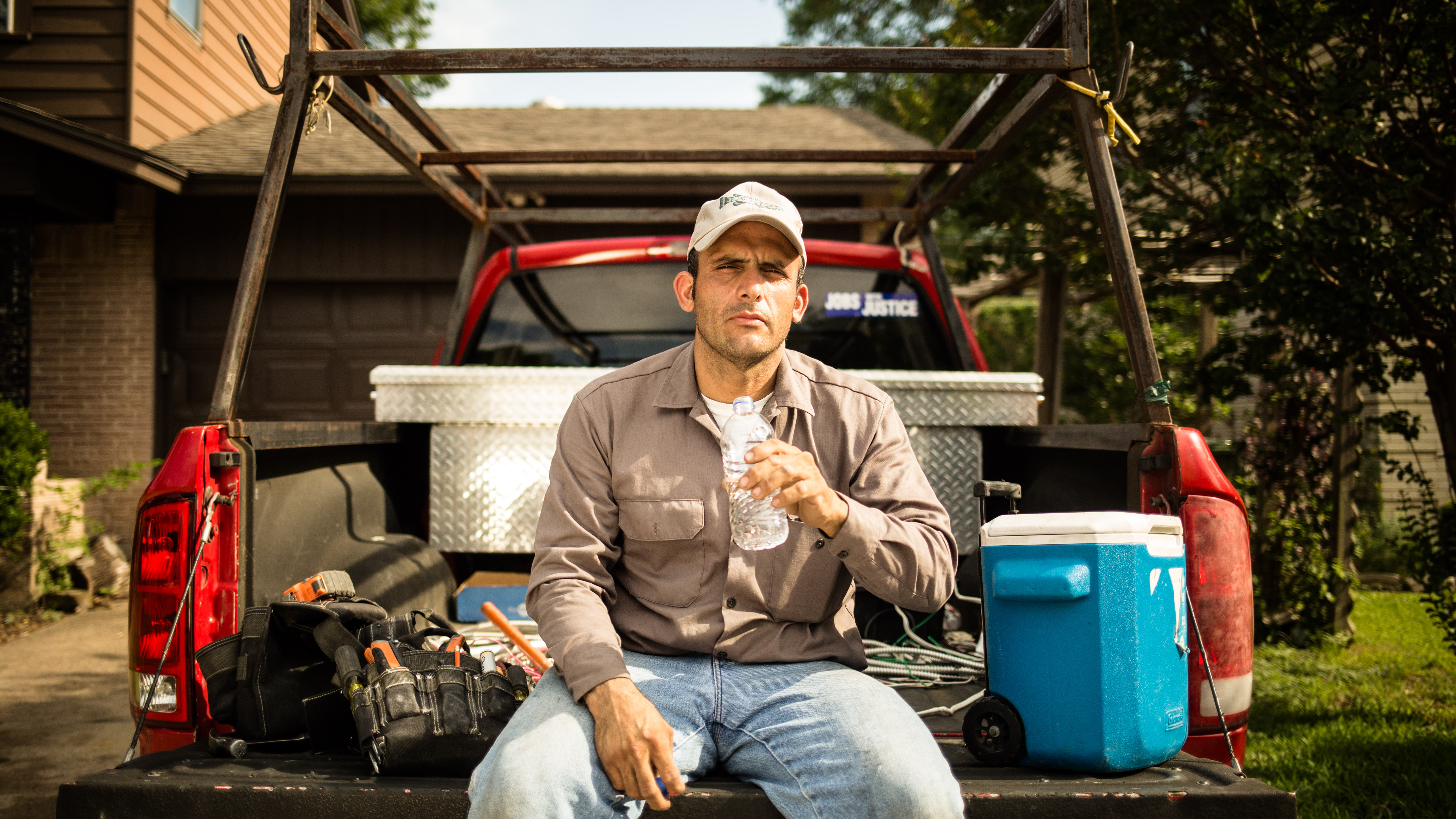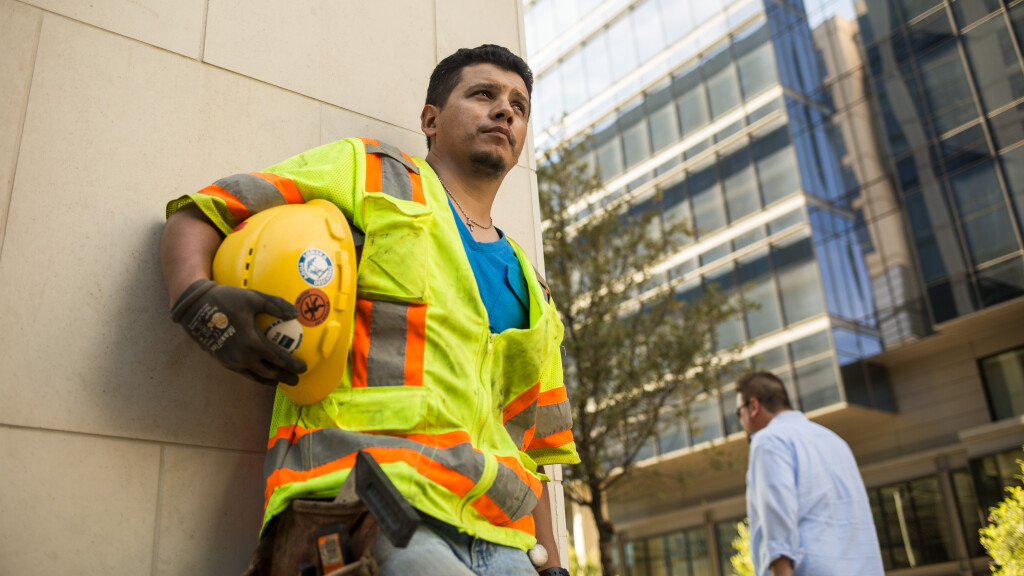Every year, from September 15-October 15, the United States commemorates the wide contributions of the American Latino community during Hispanic Heritage Month. Latino Public Broadcasting is proud to begin the month with the premiere of our VOCES special ‘Building the American Dream’. The film honors the hardworking Latino immigrants who build our American Dream, while also revealing eye-opening truths about the injustices they face in an exploitative construction industry. We interviewed director-producer Chelsea Hernandez to talk about the development of the film and her hopes for its impact.
‘Building the American Dream’ premieres tonight, September 15, 2020 at 10/9c on PBS, PBS.org, and the PBS video app.
‘Building the American Dream’ sheds light on a movement to fight widespread construction industry injustices against immigrant labor. How did you come across this story and what was your purpose in pursuing it?
I came across this story as I was attending film school at the University of Texas and in 2009 there was a terrible construction accident near campus. Three workers fell to their death when their scaffold collapsed while building a student condominium. Before I had become so numb to the rapid growth occurring in my hometown of Austin, but this accident really woke me up to the realization that workers were risking their lives everyday to build this great city and the people most at risk were Latino immigrants. So in seeking out families and their stories, my goal was to wake up others numb to growth in their own city and community in hopes it could change hearts and minds about the immigrants who build this country.
It is no secret that the Texas construction industry hires undocumented workers. The industry takes advantage of these workers by not prioritizing their safety and oftentimes, by not compensating them for their work. Thankfully, organizations such as the Workers Defense Project, seek to hold the government and corporations accountable. How important are these organizations for the fight against injustice?
Worker Centers have been starting up and expanding across the country over the past decade and it’s a great resource to help immigrant and Spanish-speaking workers learn their rights and voice their concerns, and potentially take legal action. In Texas, worker centers collaborate with unions and other organizations fighting against injustice. In Dallas, multiple groups came together to fight for rest breaks including Texas Organizing Project, Dallas AFL-CIO and faith-based groups. The film showcases collective action and I think worker centers really help define that as well.

Alex drinks water on a hot day in Texas. There is no state or federal law that requires construction companies to give their workers a rest break. Photo credit: Moyo Oyelola
As one watches the film, the title becomes even more poignant because it draws a reference to the statement that immigrants built America, yet we also see that they do not always benefit and have access to the “dream.” Would you like to share your interpretation of the title?
The title is definitely playing on what the dream is and who is allowed to obtain it. I don’t doubt that undocumented and immigrant workers helped build every new skyrise in downtown Austin over the last decade. But how much did they get paid, or were they robbed of their wages? Did they get hurt and dumped off at the hospital without receiving medical compensation or hearing from their boss again? This isn’t the dream for many who have fled their countries to seek one free of violence and poverty had ever imagined. And yet, the “dream” is touted as the American way. The film title expresses the irony behind the topic but also puts the builders first since they are the foundation to the so-called “dream.”
Production for the film began four years ago and within that timeframe, you’ve witnessed a movement that won workplace improvements within Texas. How would you describe the status of the Texas construction industry as it exists today? How much has changed or stayed the same?
I’m not a labor expert and there are some great ones out there who could speak specifically to numbers, but what I do know is that we continue to see stories of workers being exploited. In 2017 when Hurricane Harvey hit, many workers were not given correct safety gear to clean and rebuild homes. They faced unhealthy conditions and were paid very little. Politico conducted a nine-month investigation into wages in 15 states, including Texas, and 41% of wages that were owed to workers were never recovered. So, yes, some strides have been made but there’s still a lot of work to be done. And when battles are won, we need to inform workers of their rights so they can voice complaints without the risk of losing their job.
How did it feel to be present for the fight of the workers as they pushed for and succeeded in changing a local law that would benefit the safety of construction workers?
It was very powerful to see first-hand and just overall inspiring.
What does it mean to you to have the film premiere at a time when the appreciation, yet mistreatment of essential workers has entered the consciousness of the country?
I had never planned for this timing to be honest. I was hoping for an earlier release especially when major events were happening like the election in 2016 and the family separations at the border. But I also felt like this issue had been happening for a long time and so it didn’t matter who was in the White House or what was in the current news. I wanted to make sure this story was told as strong as it could be to make an impact on audiences. Timing is definitely a huge part in a film’s success and impact so I am thankful it’s coming out now in an election year. I hope people will have a new appreciation for construction workers and immigrants, recognizing their importance and voice in this country, that they have always been essential and will continue to be so

Christian, a carpenter in Austin, Texas, lost his father to a roofing accident. He now advocates for safe working conditions and immigration reform as a DACA recipient. Photo credit: Moyo Oyelola
The film has had a successful festival run that includes the HBO New York Latino Film Festival and Workers Unite! Film Festival. How does the broadcast version differ from the festival one?
We had to cut 20 minutes out of the festival version to air on TV. It was heart-wrenching to cut that much out, but in order to reach millions of people we had to make a few tough decisions. There’s a little more from each worker in the festival version that’s not in the TV one.
What are you hoping for in terms of the film’s impact on labor policy?
I hope people get inspired to join a movement or continue pushing for legislation in the movement they are in to help get better laws put in place to protect all workers, and especially immigrant workers. We are seeing the rapid effects of global warming in the West and outdoor workers continue to work in harsh conditions. They should be given a basic right to rest for 10 minutes every 4 hours.
What are you most hoping audiences will learn from watching the film?
I hope audiences will recognize the hard work and contributions of immigrant workers. That they are human beings here to raise their families and work to provide for them and for others. It’s a simple thought but many forget or follow the anti-immigrant rhetoric in the news and by political leaders.
About the filmmaker: Chelsea Hernandez is a Mexican-American filmmaker based in Austin, Texas. Her work focuses on the unique perspectives of various issues and topics through the lens of ordinary people who challenge the status quo and injustices in this world. She is a fellow of Firelight Media Doc Lab, Tribeca All Access, Bay Area Video Coalition (BAVC) National Mediamaker Program, and NALIP Latino Media Market. Chelsea has been working in the documentary film and television industry for 10 years. Building the American Dream is her feature directorial debut.
2888 Views




